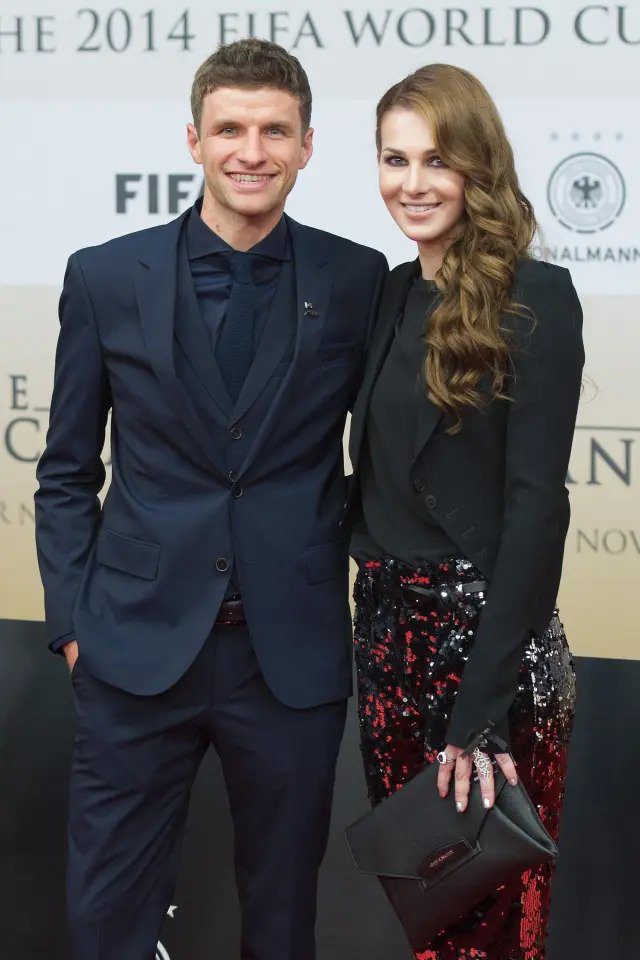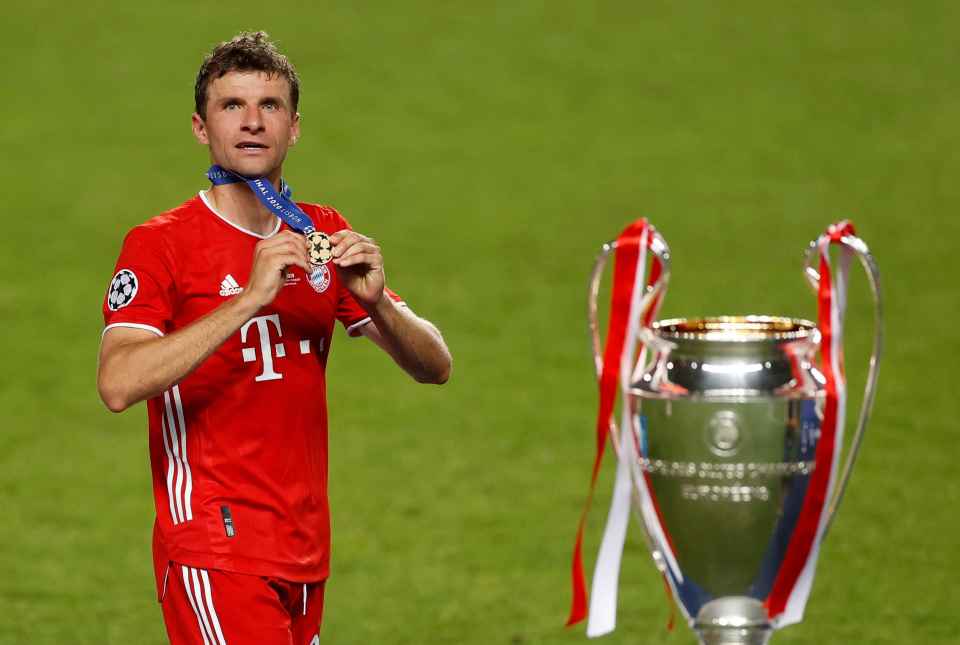Thomas Müller Height Weight Age Biography Family Wiki Net Worth, Affairs, Marriage & much more. Thomas Müller (born 13 September 1989) is a German professional footballer who plays for Bundesliga club Bayern Munich and the Germany national team. A versatile player, Müller has been deployed in a variety of attacking roles – as an attacking midfielder, second striker, centre forward, and on either wing. Müller has been praised for his positioning, teamwork, stamina, and work-rate, and has shown consistency in both scoring and creating goals. He is regarded as one of the best off-the-ball players of all time due to his positional awareness. Müller holds the record for the most assists given in the Bundesliga, with 152.
A product of Bayern’s youth system, Müller has represented the club ever since. He made his first-team breakthrough in the 2009–10 season after Louis van Gaal was appointed as the main coach; he played almost every game as the club won the league and cup double and reached the Champions League final. Müller scored 23 goals in the 2012–13 season as Bayern won a historic treble; the league title, cup and Champions League. He broke the Bundesliga record for assists by providing 21 in a season (a record in the top five leagues jointly held with Lionel Messi in La Liga) and scored 14 goals as Bayern won a second treble in the 2019–20 season.
Müller earned a call-up to the German national team in 2010. At the 2010 World Cup, he scored five goals in six appearances as Germany finished in third place. He was named the Best Young Player of the tournament and won the Golden Boot as the tournament’s top scorer, with five goals and three assists. At the 2014 World Cup he played a major role in helping the team win the trophy, scoring five goals and receiving the Silver Ball as the tournament’s second-top player and the Silver Boot as the second-top goalscorer, and was also named in the World Cup All-Star XI and in the Dream Team. In 2014, Müller was ranked the fifth-best footballer in the world by The Guardian. Müller is the most decorated German footballer in history, with 32 trophies.
Personal life
Müller was born in Weilheim in Oberbayern, Bavaria. He grew up in the nearby village of Pähl, which became the centre of media attention during his World Cup exploits. His parents are Klaudia and Gerhard, and he has a brother, Simon, who is two and a half years younger.
Müller married his long-time girlfriend Lisa Trede, a semi-professional equestrian who works on a farm, in December 2009 after being engaged for two years. In June 2011, he became an ambassador for YoungWings, a charity that helps children who have suffered bereavement or trauma. He is Catholic.
Thomas Müller Height Weight Age Body Statistics Biography


Club Career
Early career
Müller played as a youth for TSV Pähl, and at the age of 10 he made the 50-kilometre (31 mi) journey to join local Bundesliga side Bayern Munich in 2000. He progressed through the youth system and was part of the team that finished runner-up in the Under 19 Bundesliga in 2007.
Bayern Munich
He made his debut for the reserve team in March 2008 when he replaced Stephan Fürstner in a Regionalliga match against SpVgg Unterhaching, in which he scored. He made two more Regionalliga appearances in the 2007–08 season, while continuing to play for the under-19 team. The following season, Bayern’s second string qualified for the newly formed 3. Liga, and Müller established himself as a key player – he played in 32 out of 38 matches and scored 15 times to make him the league’s fifth top scorer.
International Career
Müller represented Germany at various youth levels, starting with the under-16s in 2004. In August 2009, he was called up to the under-21 team for his debut in a 3–1 friendly defeat against Turkey. He earned six caps for the under-21s and scored one goal, the eighth in an 11–0 thrashing of San Marino.
In October of the same year, Müller’s regular appearances for Bayern’s first team caused Germany national team manager Joachim Löw to publicly consider him for a call-up, despite initial reluctance from the Bayern Munich board; the following month, Müller was named in the squad for a friendly against the Ivory Coast. However, this coincided with the death of national team goalkeeper Robert Enke, which led to the cancellation of a match against Chile the same week. With less opportunity to try out new players, and with the under-21 team facing crucial qualifiers for the 2011 European Championship, Löw and under-21 manager Rainer Adrion felt that Müller was needed at the under-21 level, and Müller was called back into the under-21s.
Read More: Harry Kane
He was back in the senior squad for its next get-together, a training session in Sindelfingen in January 2010, and was named in the squad for the following match, a friendly against Argentina in March. He made his debut in this game in the starting XI at the Allianz Arena, his home stadium with Bayern. He was substituted in the 66th minute for fellow debutant Toni Kroos as Germany lost 1–0.
Exclusion from national team
On 5 March 2019, national team coach Joachim Löw confirmed that he would plan without Müller for the foreseeable future, along with his club teammates Jérôme Boateng and Mats Hummels. Müller said after the decision that he was “angry and surprised” why Löw decided to drop him and his Bayern teammates. However, after Löw later admitted in March 2021 that he was considering reversing his decision and allowing the previously barred players to partake in the upcoming UEFA Euro 2020, Müller insisted he was “definitely ready” to return to international duty, stating his desire to win another title with Germany.

Style of play
Müller’s role can be described as an attacking all-rounder, a versatile player who is able to play in a variety of offensive positions. As he came through the youth system, he was seen primarily as a midfielder, but since breaking into the first-team he has been used in more attacking roles. Bayern Munich usually plays a 4–2–3–1 formation, and Müller is most often part of the three attacking midfielders behind the central striker. He can play in any of the attacking midfield roles but usually plays in the centre for Bayern, but has also played on the right wing, especially for Germany. He has been used in a central attacking role as an out-and-out striker on occasion, or even as a second striker.
Although he lacks physical strength, Müller has been praised for his maturity, technique, awareness, tactical intelligence, and positioning. He has been particularly noted for his composure; former Germany manager Joachim Löw said he is “impervious to pressure” and former Bayern manager Louis van Gaal said he has tremendous mental strength. A consistent scorer and creator of goals, Müller has been lauded in the media for his intelligent movement off the ball and ability to time his attacking runs; he describes himself as a player who can find gaps in the opposition defence but not particularly good at dribbling or one-on-ones. Müller describes this role as Raumdeuter, a term which translates, literally, to “space interpreter” (cf. Traumdeuter, “dream interpreter”). During the 2014 World Cup, Germany manager Joachim Löw stated that Müller “is a very unorthodox player and you can’t really predict his lines of running, but he has one aim and that is ‘how can I score a goal?'”. In addition to his offensive capabilities, Müller has also been praised by pundits for his teamwork, stamina, and defensive work-rate. Former Bayern assistant coach Hermann Gerland gave him the nickname Radio Müller for his loud and frequent comments on the pitch and in the dressing room.
Career Statistics
Club
As of match played 26 October 2022
| Club | Season | League | DFB-Pokal | Europe | Other | Total | |||||
|---|---|---|---|---|---|---|---|---|---|---|---|
| Division | Apps | Goals | Apps | Goals | Apps | Goals | Apps | Goals | Apps | Goals | |
| Bayern Munich II | 2007–08 | Regionalliga Süd | 3 | 1 | — | — | — | 3 | 1 | ||
| 2008–09 | 3. Liga | 32 | 15 | — | — | — | 32 | 15 | |||
| Total | 35 | 16 | — | — | — | 35 | 16 | ||||
| Bayern Munich | 2008–09 | Bundesliga | 4 | 0 | 0 | 0 | 1 | 1 | — | 5 | 1 |
| 2009–10 | Bundesliga | 34 | 13 | 6 | 4 | 12 | 2 | — | 52 | 19 | |
| 2010–11 | Bundesliga | 34 | 12 | 5 | 3 | 8 | 3 | 1 | 1 | 48 | 19 |
| 2011–12 | Bundesliga | 34 | 7 | 5 | 2 | 14 | 2 | — | 53 | 11 | |
| 2012–13 | Bundesliga | 28 | 13 | 5 | 1 | 13 | 8 | 1 | 1 | 47 | 23 |
| 2013–14 | Bundesliga | 31 | 13 | 5 | 8 | 12 | 5 | 3 | 0 | 51 | 26 |
| 2014–15 | Bundesliga | 32 | 13 | 5 | 1 | 10 | 7 | 1 | 0 | 48 | 21 |
| 2015–16 | Bundesliga | 31 | 20 | 5 | 4 | 12 | 8 | 1 | 0 | 49 | 32 |
| 2016–17 | Bundesliga | 29 | 5 | 3 | 0 | 9 | 3 | 1 | 1 | 42 | 9 |
| 2017–18 | Bundesliga | 29 | 8 | 5 | 4 | 10 | 3 | 1 | 0 | 45 | 15 |
| 2018–19 | Bundesliga | 32 | 6 | 6 | 3 | 6 | 0 | 1 | 0 | 45 | 9 |
| 2019–20 | Bundesliga | 33 | 8 | 6 | 2 | 10 | 4 | 1 | 0 | 50 | 14 |
| 2020–21 | Bundesliga | 32 | 11 | 2 | 1 | 9 | 2 | 3 | 1 | 46 | 15 |
| 2021–22 | Bundesliga | 32 | 8 | 2 | 0 | 10 | 4 | 1 | 1 | 45 | 13 |
| 2022–23 | Bundesliga | 8 | 2 | 2 | 0 | 4 | 1 | 1 | 0 | 15 | 3 |
| Total | 423 | 139 | 62 | 33 | 140 | 53 | 16 | 5 | 641 | 230 | |
| Career total | 458 | 155 | 62 | 33 | 140 | 53 | 16 | 5 | 676 | 246 |
International
As of match played 26 September 2022
| National team | Year | Apps | Goals |
|---|---|---|---|
| Germany | |||
| 2010 | 12 | 5 | |
| 2011 | 13 | 5 | |
| 2012 | 13 | 0 | |
| 2013 | 9 | 6 | |
| 2014 | 15 | 10 | |
| 2015 | 6 | 5 | |
| 2016 | 15 | 5 | |
| 2017 | 6 | 1 | |
| 2018 | 11 | 1 | |
| 2019 | 0 | 0 | |
| 2020 | 0 | 0 | |
| 2021 | 10 | 4 | |
| 2022 | 8 | 2 | |
| Total | 118 | 44 |
References: Wikipedia








